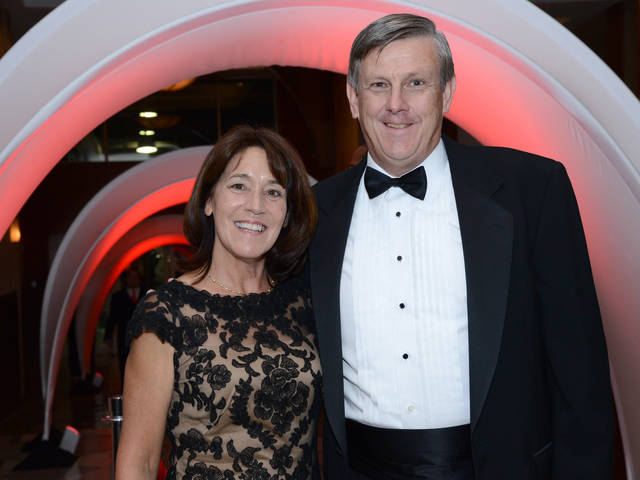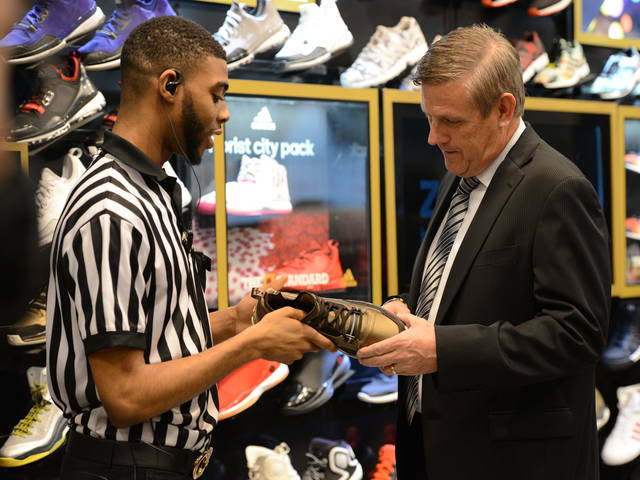Alumnus successfully navigates international company through pandemic
Foot Locker CEO learned to listen at UW-Eau Claire
Story by Gary Johnson, video by Glen Mabie

Foot Locker CEO Dick Johnson and his wife, Mary, received a Lifetime Excellence Award from the UW-Eau Claire Alumni Association in 2017.
Dick Johnson left his Midtown Manhattan office on Friday, March 13, 2020, for a long weekend with his wife, Mary, in Naples, Florida, a brief respite for the chairman, president and CEO of international shoe and apparel company Foot Locker Inc.
A year later, the two University of Wisconsin-Eau Claire alumni have not been back to their New Jersey apartment.
The same day Johnson headed to Florida, then-President Donald Trump declared the novel coronavirus COVID-19 a national emergency. The pandemic that had swept across Asia and Europe during the winter had enveloped the U.S. and would dramatically change how multinational businesses like Foot Locker would operate in the coming year and beyond.
“By Sunday afternoon, I was on the phone with my executive leadership team talking about closing 3,100 stores,” says Johnson, a 1982 UW-Eau Claire graduate. “That is literally how quickly it happened.”
Three days later, Johnson and his administrative team systematically started closing Foot Locker stores in 28 countries — one or multiple countries at a time, depending on local regulations — and moved toward becoming a completely digital company.
Like businesses around the U.S. and world, Foot Locker, a company with $8 billion in sales in 2019, faced a plethora of decisions about customer and employee safety, and the operations of distribution centers, call centers and customer contact centers.
“We made decisions,” Johnson says. “My team did a tremendous job around me supporting the decisions we made and the moves we had to make to get to where we are today.
“If people tell you they had a pandemic playbook ready to go, I would question the legitimacy of that comment. Like many companies, we made it up on the fly.”
Johnson is thankful for his talented management team at Foot Locker, but he also had his UW-Eau Claire education to fall back on. His alma mater didn’t have any courses on reacting to a pandemic while he was studying accounting on campus in the late 1970s and early ’80s, but he did take a speech class on the topic of active listening, which would prove invaluable during his career.
Looking back, Johnson jokes that as a 19- or 20-year-old college student entering that speech class, he wasn’t accustomed to listening to many people.
“To actually have to listen and get an understanding of other people’s point of view is one of those things that absolutely helped me,” Johnson says. “I fall back on it today. I’m expected to, in my role, make decisions and do things, but if I’m in a position to do that, I want to listen and take in a lot of things and understand people’s points of view so we can march forward together.
“As we focus on diversity across the organization, it’s diversity of thought that really drives our business. In order to be able to work through some of those difficult conversations, you’ve got to have the ability to be an active listener, to ask questions, to understand somebody’s point of view. I think one of the things that has helped drive my success is the ability to ask the right questions at the right time.”
Among the decisions Johnson and his Foot Locker team made in mid-March of 2020 was to continue paying workers as stores closed.
“Many companies in the retail world furloughed their employees on Day 1,” Johnson says of the pandemic. “We made the decision we were going to try to pay our associates as long as we could because we knew this was going to be a catastrophic situation for a lot of people who depended on that income.
“We closed our stores in mid-March, we paid our employees through the end of April before we finally had to start furloughing people, but at that point we had a view that we would be opening doors back up sometime in May.”
Foot Locker stores did slowly reopen in May, depending on local restrictions.
“We furloughed a lot of employees back at the end of April, and almost 95% of them came back to work for us,” Johnson says.
Johnson’s work hasn’t gone unnoticed in the shoe industry.
A story in Footwear News in December 2020 recognized Johnson for being named to the magazine’s Hall of Fame, noting the CEO’s efforts during the pandemic and his leadership with “a sense of compassion and his signature Midwestern work ethic.”
“Dick has always been a true partner who prioritized teamwork and collaboration between our brands,” Jim Davis, chairman of New Balance Athletics, told the magazine. “His long and successful career has been guided by his strong Midwestern values, broad perspective and impeccable integrity.”
Remembering his college days
Johnson certainly didn’t see himself overseeing a multinational company when he graduated from Mount Horeb High School in 1976. He attended Madison Area Technical College with his eye on being a cook or perhaps owning his own restaurant. After a year at MATC, he enrolled at UW-Eau Claire because he was familiar with the campus — his older sister was a Blugold — and he wanted to run on the cross country, and track and field teams.
Those college days in Eau Claire left a lasting impression on Johnson. While he says he didn’t have an outstanding athletic career at UW-Eau Claire, Johnson never will forget the team camaraderie he felt while a Blugold runner.
“We were really like a brotherhood,” Johnson says of his running teammates. “You’d go to class all day, you’d go to workouts, you’d have fun with them on the weekends and you got to know them really well. I stay in touch with a lot of those guys and still continue to keep up with them.”
In the classroom, Johnson recalls how UW-Eau Claire faculty members were passionate about teaching and their students, especially Dr. Larry Ozzello, who taught accounting for 36 years at UW-Eau Claire and was department chair for 26 years.
“He’s the one who really sat me down and said, ‘You have to figure out what you want to do. You’ve got the talent, the skills, the knowledge to do it, but you have to decide. You can’t do anything halfway, you’ve got to really commit,’” Johnson says of Ozzello. “He was one of the guys that started me on this journey that I’ve been on.”
While running and business courses were primary focuses of Johnson’s time on campus, he also met his future wife, Mary, during their first week on campus. Nearly 40 years later in 2017, the Johnsons would receive a Lifetime Excellence Award from the UW-Eau Claire Alumni Association.
‘Simply the caretaker’

Dick Johnson says his UW-Eau Claire education laid the foundation for him to one day become the leader of multinational company Foot Locker.
After college, Johnson worked for several firms as an auditor and systems developer before joining Eastbay in Wausau. When Foot Locker acquired Eastbay, Johnson started his journey with the international company that took him to Europe and back before becoming president and CEO in 2014, and chairman two years later.
Since 2014 when Johnson assumed the CEO position, Foot Locker sales have grown by $850 million to a total of $8 billion in 2019. Despite the pandemic, sales totaled $7.5 billion in 2020.
Johnson modestly says he’s “simply the caretaker” at Foot Locker as he moves the company through an unprecedented time in history.
“One of the things that people forget is that 2020 wasn’t just COVID,” Johnson says. “You throw into the middle of COVID the social unrest that we faced after the George Floyd murder in Minneapolis. Certainly that had a huge impact on us. Millions of dollars of damage and looting in response to a change that has to happen. Then on top of that, the political maelstrom that formed as we got closer to the (presidential) election.
“You’ve got all of these things working at once. The three of them separately are a big deal. When you pile them on top of each other, the resiliency and the agility that our team had to show was just incredible.”
Floyd’s death and other racial incidents across the country in 2020 prompted Foot Locker to commit $200 million over the next five years to support Black-owned businesses, entrepreneurs and communities.
Foot Locker has made strategic shifts to realign how the company works, buys and partners with Black creators, businesses and organizations because the company wants to be part of a systematic change that needs to be made to create more economic equality in the U.S., Johnson says.
“When I started talking to our leaders, our Black leaders who have raised kids, and we talked about the situation that George Floyd found himself in or Breonna Taylor found herself in, the list of names goes on and on,” Johnson says. “It’s not something that I can say I’ve ever stood in their shoes, but when you listen to the emotion and you understand how unjust the system has been and how systematically we have to make a difference, we have to force change to happen.”
Johnson says that he and his company have known for a long time that young people, with their strong voices and opinions, will ultimately influence the changes that make this country a better place.
“This is a significant opportunity for us because I hope the $200 million turns into $200 million more and turns into $1 billion, that it just keeps multiplying,” Johnson says.
Giving back to UW-Eau Claire
Despite his busy CEO schedule, Johnson hasn’t forgotten about UW-Eau Claire. In addition to serving on Chancellor James Schmidt’s National Leadership Council, Johnson interacts virtually with Blugold business students each semester in a course focused on investment strategies. Johnson discusses career choices with students while they question the alumnus about the business world.
Johnson enjoys the time with fellow Blugolds and says he will take part in the classroom discussion as long as he is Foot Locker CEO.
“A lot of times they want to understand how a guy from Mount Horeb, Wisconsin, ends up running a Fortune 500 company,” Johnson says of the students. “What was the journey like? How did you get to that point? I tell them to be willing to take risks. I tell them don’t believe you are entitled to anything. You have to work for everything. I reflect on that frequently.”
Johnson is a down-to-earth person who is “an incredible role model for students to look up to,” says Mark Alfuth, a senior lecturer in accounting and finance at UW-Eau Claire who first invited Johnson to speak to business classes.
“The cool thing is these students are looking at a CEO who is from southern Wisconsin, who ran cross country here at UW-Eau Claire, who sat in the same seats that they are sitting in, and he became the president of a multinational company,” Alfuth says. “That’s motivation and impact. These students just connect with him. They say, ‘I can do this. I can succeed.’”
Alfuth calls the interaction with the leader of an international company like Foot Locker a high-impact experience that is transformative for his students who want to work in business. Alfuth calls Johnson “the epitome of a leader.”
“He connects with these students in a way that directly affects their lives. They tell me that,” Alfuth says. “I can tell you for a fact that some of these students talked about their experience with Dick during job interviews and they got the job. That’s an alumnus impact.”
Contact The View
We want to hear from you